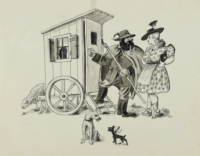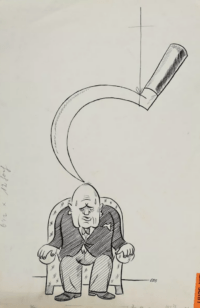Josef Geis
Josef Nikolaus Geis (* June 10, 1892, in Munich; † September 1, 1952, in Munich) was an artist, illustrator, and graphic designer based in Munich. He painted for the humorous weekly magazine “Fliegende Blätter” and later for the Munich art and literary magazine “Jugend,” for which he often designed the cover. For the Social Democratic Party of Germany (SPD), Geis created striking posters against National Socialism, including a 1929 poster depicting the stereotype of the “subverted Bolshevik.”
Geis was a member of the Reichsverband Bildender Künstler Deutschlands and gained recognition for his work in Munich magazines such as “Jugend,” “Simplicissimus,” “Fliegende Blätter,” and “Meggendorfer Blätter.” He also designed advertising posters, event posters, and political posters, including those for the Munich Zoo.
Some of his notable poster designs include:
Absolvia Luitpoldiana, 1912
Fest der Kunstgewerbeschüler
Sammelt Brennessel! – Wenn ihr Kleidung und Faden wollt!
Rot ist dein Tod. Hausbesitz wähle Liste 12, 1929
Faschings-Festzug-München, 1929
An diesem System stirbt das Volk – wählt Sozialdemokraten Liste 1, 1932
His illustrated books include:
Walter Leipziger: Die sieben Schwaben. Vier Tannen Verlag, Berlin 1950.
Anders Christian Westergaard: Klein-Ingrid: Happy Adventures of a Little Girl in a Big City. Schneider, Augsburg 1953.
Hans Bachwitz: Bibimatz, Lebenskarambolagen eines Schlehmils. New Series, Braun & Schneider, Munich 1928.
Josef Nikolaus Geis was the grandson of the folk singer Jakob Geis. His father was the actor and singer Josef Geis (1867–1940), and his brother was the dramaturge and screenwriter Jacob Geis.
Showing all 7 resultsSorted by latest
-
Tratscherei | Federzeichnung von Josef Geis | Fliegende Blätter
Joseph Nikolaus Geis (1892-1952)
-
Mann in Sessel | Federzeichnung von Josef Geis | Fliegende Blätter
Joseph Nikolaus Geis (1892-1952)
-
Schäferwagen | Federzeichnung von Josef Geis | Fliegende Blätter
Josef Geis (1892-1952)
-
England unter dem Kommunismus | Politische Karikatur von Josef Geis | Fliegende Blätter
Josef Geis (act. 1920-1930)
-
Sowjetischer Bär | Federzeichnung von Josef Geis | Fliegende Blätter
Joseph Nikolaus Geis (1892-1952)
-
England und der Kommunismus | Federzeichnung von Joseph Nikolaus Geis | Fliegende Blätter
Josef Geis (1892-1952)
-
Politische Karikatur | Federzeichnung von Josef Geis | Fliegende Blätter
Josef Geis (1892-1952)







